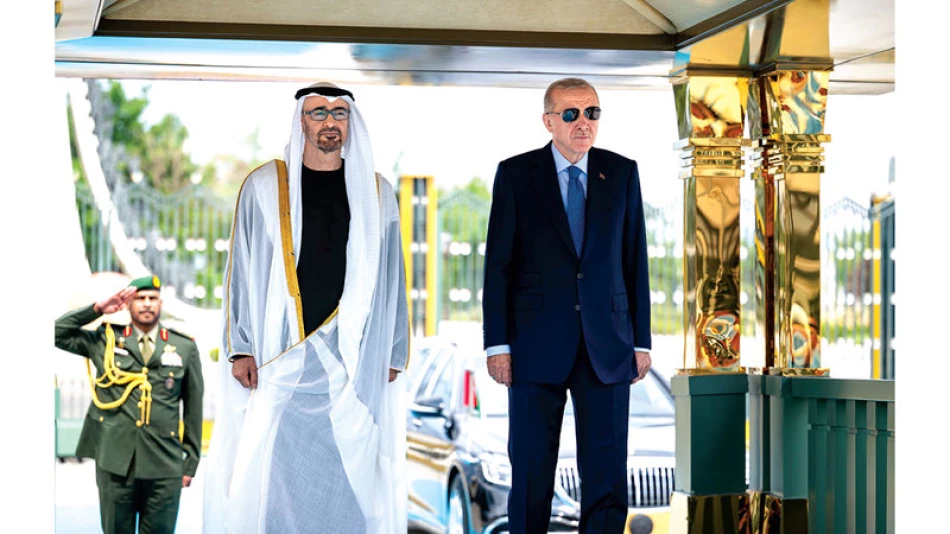
Mohammed bin Zayed's Turkey Visit Sparks Joint Statement on Strengthening Bilateral Ties
UAE and Turkey Forge Strategic Partnership with Eye on Energy Transition and Regional Stability
The UAE and Turkey have elevated their diplomatic and economic relationship to new heights following the inaugural meeting of their High Strategic Committee in Ankara, with both nations positioning themselves as key players in the Middle East's energy transition and regional stability. The landmark visit by UAE President Sheikh Mohammed bin Zayed Al Nahyan signals a broader realignment of Gulf-Turkish relations that could reshape economic corridors between Europe, Asia, and the Arab world.
A Partnership Built on Economic Pragmatism
The strategic committee meeting, held on July 16, 2025, underscores how both nations are prioritizing economic diversification over historical political differences. The comprehensive discussions covered defense, cybersecurity, renewable energy, and advanced technologies—sectors that have become increasingly critical for Middle Eastern nations seeking to reduce their dependence on traditional oil revenues.
Under the framework of their Comprehensive Economic Partnership Agreement, both countries are exploring integrated and flexible trade routes that could position them as crucial links in global supply chains. This move mirrors similar strategies employed by Singapore and the UAE in establishing themselves as regional trading hubs, but with the added advantage of Turkey's strategic location bridging Europe and Asia.
Energy Cooperation Takes Center Stage
Renewable Energy Ambitions
The partnership's emphasis on renewable energy cooperation reflects both nations' commitment to the COP28 global targets of tripling renewable energy capacity by 2030. Turkey's ambitious renewable energy projects, combined with the UAE's expertise in solar technology and substantial investment capital, create a powerful synergy that could accelerate the region's energy transition.
This collaboration is particularly significant given Turkey's energy import dependency and the UAE's position as a major energy exporter. The partnership could help Turkey diversify its energy sources while providing the UAE with new markets for its clean energy technologies and investments.
Water Security as a Strategic Priority
The emphasis on the upcoming UN Water Conference 2026, to be hosted by the UAE in partnership with Senegal, highlights water security as a critical component of regional stability. The Mohammed bin Zayed Water Initiative represents a practical approach to addressing water scarcity challenges that affect both nations and the broader Middle East region.
Defense and Security Cooperation
The renewed commitment to defense cooperation signals a pragmatic approach to regional security challenges. Both nations have learned from recent regional conflicts that diversified partnerships enhance security more effectively than traditional alliance structures. This cooperation could include technology transfer, joint training programs, and intelligence sharing on cybersecurity threats.
Market and Investment Implications
For investors and businesses, this partnership opens several opportunities. The focus on public-private sector cooperation suggests that both governments are actively seeking to create business-friendly environments that attract foreign investment. The emphasis on emerging technologies and digital innovation indicates potential growth in fintech, renewable energy, and advanced manufacturing sectors.
The agreement to establish the next High Strategic Committee meeting in Abu Dhabi in 2026 provides a clear timeline for businesses to plan investments and partnerships. Companies in renewable energy, water technology, and digital infrastructure are likely to benefit most from this strengthened relationship.
Regional Context and Future Outlook
This UAE-Turkey partnership reflects a broader trend of Middle Eastern nations prioritizing economic cooperation over ideological differences. Similar to how the Abraham Accords reshaped regional dynamics, this strategic partnership could encourage other nations to pursue pragmatic cooperation frameworks.
The signing of seven bilateral agreements and memoranda of understanding demonstrates that both nations are moving beyond symbolic gestures toward concrete implementation. The focus on youth development and advanced education suggests a long-term vision that extends beyond current leadership tenures.
As regional powers navigate an increasingly multipolar world, partnerships like this one between the UAE and Turkey may become the new model for Middle Eastern diplomacy—one based on economic mutual benefit rather than traditional geopolitical alignments. The success of this partnership could influence how other regional powers approach their own bilateral relationships, potentially leading to a more interconnected and economically integrated Middle East.
Most Viewed News

 Sara Khaled
Sara Khaled






